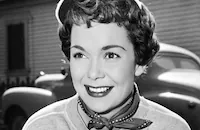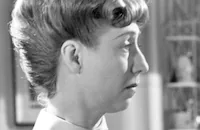Make Your Own Bed

Brief Synopsis
Cast & Crew
Peter Godfrey
Jack Carson
Jane Wyman
Irene Manning
Alan Hale
George Tobias
Film Details
Technical Specs

Synopsis
Because of the wartime servant shortage, Walter and Vivian Whirtle have no butler or maid at their suburban house. Walter, who owns a gunpowder company, promises to return one evening with new servants, but at the employment agency, he finds only a room full of people eager to hire servants of their own. After Walter disdainfully tears up a parking ticket, he is taken to jail, where he meets private detective Jerry Curtis. Walter learns that while posing as a butler, Jerry accidentally arrested a district attorney. This information inspires Walter to invent a story about a gang of spies, and he hires Jerry to investigate, disguised as a butler. Jerry persuades his fiancée, Susan Courtney, to accompany him disguised as a maid, explaining that it is his chance to gain a big reputation and open his own agency so that they can be married. Walter's plan gets an added boost when he meets the actors who are to perform on a radio program being sponsored by his gunpowder factory. As they are to play Nazi spies, Walter suggests that they rehearse at his home and then tells Jerry that he has invited all the suspects for the weekend. Unknown to Walter, the actors actually are Nazi spies who intend to steal a secret formula from him. At the Whirtles', Susan and Jerry discover that their room has only a double bed, and Jerry is forced to sleep outside. Mistaking Jerry for a thief, Walter jumps him, and Jerry seeks refuge in the women's dressing room in the pool house. The next morning, Walter sets the scene to appear as if he is being threatened. Susan becomes jealous when she sees two actresses leave the dressing room, and she and Jerry quarrel while cleaning house, thereby destroying all the evidence that Walter had carefully created. Later, Jerry overhears Vivian reading one of Walter's old love letters to their neighbor, Boris Murphy, and mistakenly thinks she and Boris are having an affair. Jerry copies the letter, and Walter, not recognizing his own words, confronts Vivian, who angrily decides to leave him. In order to stop her, Walter asks the actors to stage a robbery. Jerry overhears his plans and when the actors stage the robbery for real, he nonchalantly tries to round them up. Soon, however, everyone has been subdued by the actors. While Vivian tells Walter that he was the man who wrote her the love letter, one of the actors, who is really a federal agent, secretly loosens Jerry bonds. Jerry manages to grab a gun and then accidentally shoots out the light. During the ensuing struggle, Jerry captures the federal agent. All the Nazis escape, but are quickly captured by federal agents waiting outside. The next morning, Walter and Vivian wait on Susan and Jerry. The two couples agree that each will spend three days a week acting as servants to the other and all will rest on Sunday.

Director

Peter Godfrey
Cast

Jack Carson

Jane Wyman

Irene Manning

Alan Hale

George Tobias

Robert Shayne
Tala Birell

Ricardo Cortez

Marjorie Hoshelle
Kurt Katch
Harry Bradley
William Kennedy

Jack Mower
Leah Baird
Ernest Hilliard
George Kirby
Gertrude Carr
Barry Macollum

William B. Davidson
Robert Homans
Fred Kelsey
Edgar Dearing
Clay Womack
Eddie Parks
Joan Winfield
Jack Norton

Marie Blake
Crew
Milo Anderson
Robert Burks
Stanley Fleischer
Leo F. Forbstein
Alex Gottlieb
Lester Guthrie
Edmund Joseph
Clarence Kolster
Charles Lang
H. Roemheld
Clarence Steensen
Francis Swann
Willard Van Enger
Jack L. Warner
Richard Weil
Perc Westmore

Film Details
Technical Specs

Articles
Make Your Own Bed
By Glenn Erickson

Make Your Own Bed
Quotes
Trivia
Notes
A 16 December 1943 Hollywood Reporter news item notes that some scenes were filmed on location at the W. K. Jewett estate in Pasadena, CA.














